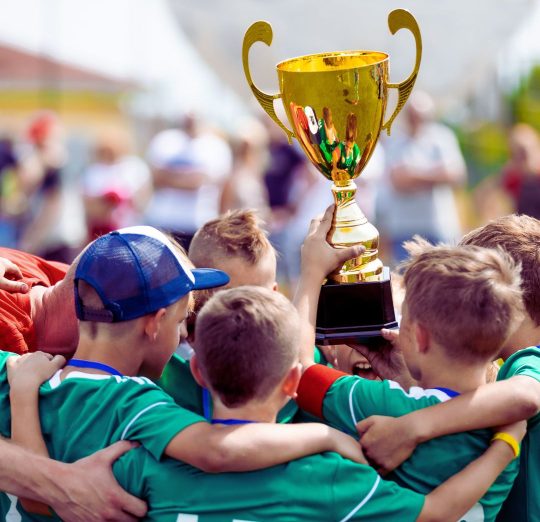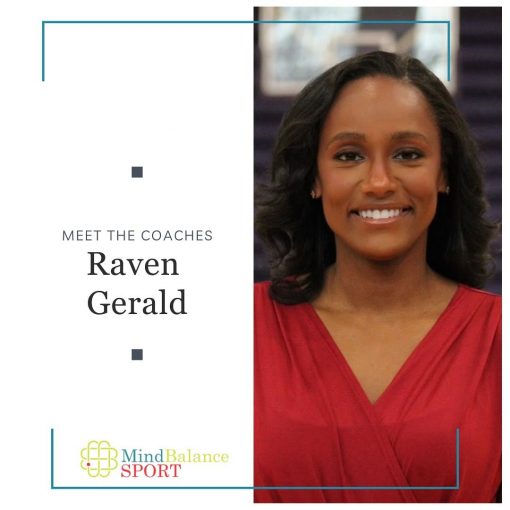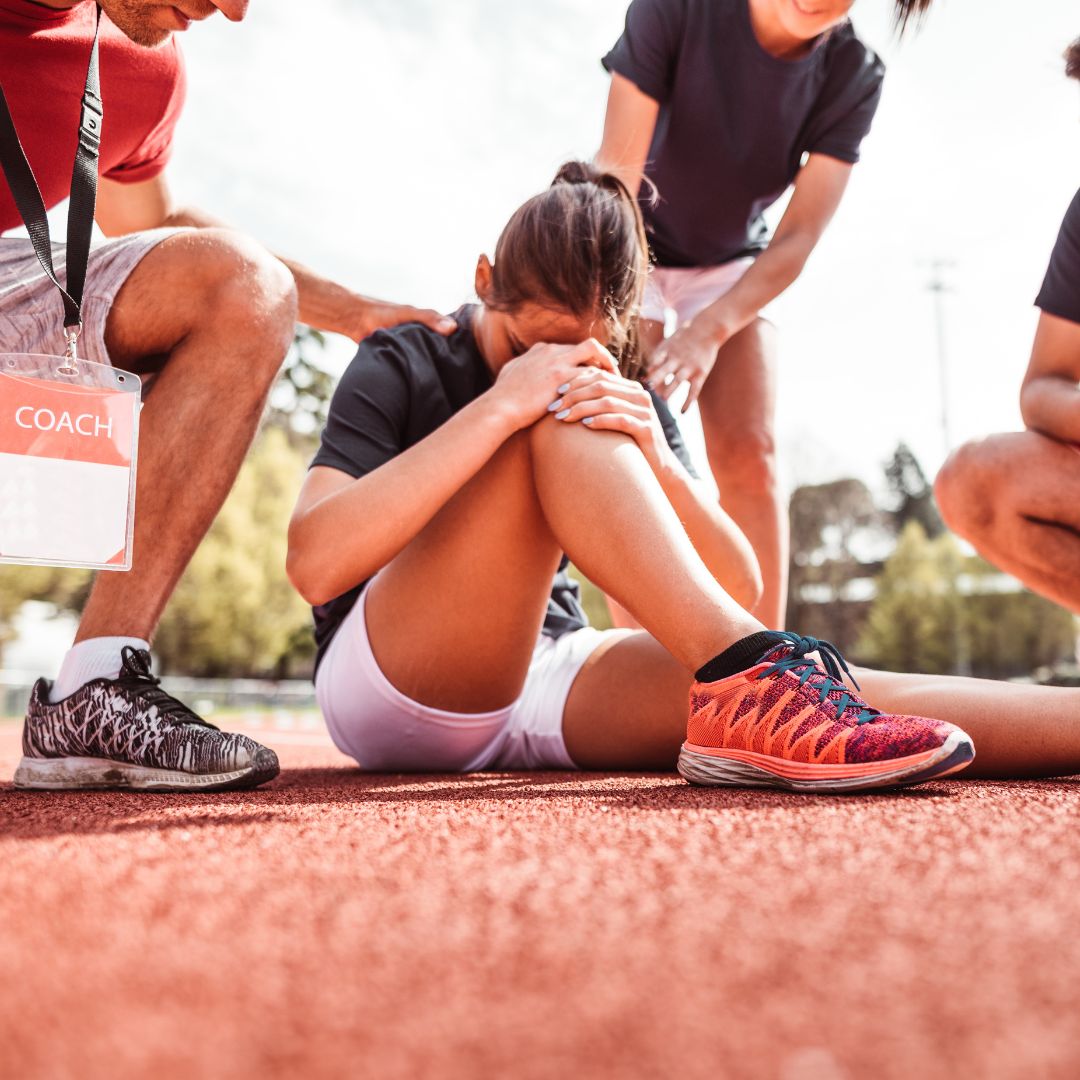Sports Psychologist in Greenbelt, MD
You want to work on your mental game, but how do you train your brain?
At MindBalanceSPORT, We Train The Other Half Of The Athlete.
You want to work on your mental game, but how do you train your brain?
Mental training does not get much media attention, but at MindBalanceSPORT we know it is a game changer. The mental skills you will learn at MindBalanceSPORT are generalizable in the classroom, in sport and in life!
We know that mental skills can be successfully taught, even at an early age.

Our Services
Meet the Team





testimonials
Athlete Stories: Real Comebacks, Real Results

Emma, a high school basketball player, tore her ACL in the middle of her junior season. After surgery, she struggled with self-doubt and fear every time she stepped back on the court. Through sport psychology training, she learned visualization techniques and confidence-building exercises that helped her regain trust in her knee. When she returned for her senior season, she didn’t just play—she led her team to the playoffs.

Carlos, a soccer player, suffered a stress fracture in his foot and had to miss half of his season. Sitting out was mentally tougher than the pain itself. We worked on mental engagement strategies to keep him sharp—studying game film, setting small rehab goals, and using mental imagery to stay ready. When he was finally cleared, his confidence never wavered.

Jordan, a track athlete, strained her hamstring before a major competition. She feared losing speed and falling behind competitors. Instead of focusing on what she couldn’t do, we redirected her energy toward mental preparation, using self-talk and goal setting to keep her confidence strong. When she returned, she set a new personal record.
EXCELLENTTrustindex verifies that the original source of the review is Google. It was a great help to my 14-year-old competitive volleyball player daughter. Raven was great to understand and connect with her from start to end. We will continue with our sessions as needed.Trustindex verifies that the original source of the review is Google. Great results! I’ve loved working with Paula. Our sessions have greatly improved both the physical and mental aspects of my tennis game. I’m playing better and having more fun! Highly recommend!Trustindex verifies that the original source of the review is Google. Our family had a wonderful experience with Paula Castro. We needed some additional confidence in a particular area/sport and Paula helped get us there. We know who to turn to if we need help again. She’s been a Blessing. Thank you, Paula!Trustindex verifies that the original source of the review is Google. I highly recommend MindBalanceSPORT. Our son works with John Howard. John is very caring, positive, and effective at working with teenagers. John is an adept listener and created an individualized plan tailored to our son’s personality. After just a few sessions with John, we noticed a significant improvement in our son’s motivation and mental approach to sports and life in general. Our son looks forward to meeting with John and tells us that he benefits immensely from their connection.Trustindex verifies that the original source of the review is Google. Paula Castro is an outstanding professional on the field. She has helped my daughter improve her confidence, preparation, and thanks to these session she feels more prepared and motivated. Paula takes the time also to share (what she can) and align with us as parents to be on the same page. Strongly recommended!Trustindex verifies that the original source of the review is Google. MineBalanceSPORT has quickly become the area's expert in sports psychology. Their reputation is well deserved given their incredibly thoughtful, scientifically based approaches to treating performance-related conditions, and I have only heard glowing, positive feedback from those who have engaged in their program. I will also add that Drs. Jones and Chirby presented to us (our group comprises of 15+ doctors and masters level clinicans) about their program and impressed us all with their level of expertise and passion for this field. I give them my highest recommendation.Trustindex verifies that the original source of the review is Google. Dr. Jones was beyond helpful to me throughout our time together. If you are an athlete and you need advice or assistance this is the place to come to. She completely changed my outlook and mindset in a time when I needed her most. I look forward to staying in touch with her and am forever thankful for her expertise.Trustindex verifies that the original source of the review is Google. Paula has been a huge help with my daughter Morgan coming off her injury. It’s been 18 months since she’s played basketball and she’s thriving because I know Paula is guiding her the right direction. As a mother, I’m extremely gratefulTrustindex verifies that the original source of the review is Google. If you are looking for Amazing Psychologists who can help support you in your sports performance, you need to call MindBalanceSPORT! Dr. Chirby and her colleagues are a wealth of knowledge, they have so many helpful techniques for mind balance, and they have so much compassion for the communities that they serve! Highly recommend!!!
Recovery
While Everyone Has A Physical Ceiling, There Is No Mental Ceiling.
How Sports Psychologists in Greenbelt, MD Can Help Overcome Perfectionism and Improve Performance
How Sports Psychologists in Greenbelt, MD Can Help Overcome Perfectionism and Improve Performance
How to Recognize the Signs of Perfectionism with a Sports Psychologist Near Me
The first step in addressing perfectionism is identifying its presence. Common indicators include: – Fear of making mistakes or failing. – Difficulty accepting constructive criticism. – Constantly feeling that performance isn’t “good enough.” – Overtraining or obsessing over every detail of preparation.
Understanding these warning signs allows athletes to actively address their mindset before it negatively impacts performance.
Focus on Progress, Not Perfection
Shifting the focus from perfect outcomes to personal improvement is essential for breaking free from perfectionist tendencies. Athletes are encouraged to: – Set process-oriented goals (e.g., “improve passing accuracy by 5%”) rather than only outcome-based goals (e.g., “win the championship”). – Celebrate small victories and incremental progress toward long-term objectives. – Track improvements over time using journals or performance logs.
Develop a Growth Mindset
A growth mindset emphasizes learning and improvement rather than an unrealistic desire for flawlessness. Key ways to adopt this mindset include: 1. Viewing setbacks as learning opportunities instead of failures. 2. Embracing feedback as a tool for growth rather than criticism. 3. Comparing current achievements only with past personal performances instead of others.
| Fixed Mindset | Growth Mindset |
| “I failed because I’m not talented.” | “I didn’t succeed this time because I need more practice.” |
| “Mistakes mean I’m not good enough.” | “Mistakes help me figure out where I can improve.” |
Practice Self-Compassion
Self-compassion is critical in managing the inner critic that often drives perfectionist tendencies. Techniques include: – Treating oneself with the same kindness and understanding offered to a teammate in similar situations. – Replacing harsh self-talk with supportive phrases such as, “I did my best today.” – Acknowledging that everyone makes mistakes—even elite athletes.
Work With a Sports Psychologist
Sports psychologists provide invaluable support by helping athletes manage perfectionist tendencies effectively. Techniques they use may include: 1. Cognitive Behavioral Therapy (CBT) – To challenge unhelpful thought patterns. 2. Relaxation Training – To reduce anxiety caused by excessive pressure. 3. Visualization Exercises – To build confidence through mental rehearsal of success scenarios.
Learn to Embrace Mistakes
Accepting mistakes as part of any athletic journey helps athletes reduce fear-based decision-making during competition. Coaches and mentors can assist by emphasizing effort over error-free execution during training sessions.
By implementing these strategies into their training routines, athletes can learn how to balance striving for excellence with maintaining mental well-being—creating an environment where both personal growth and peak performance thrive together.
How Sports Counselling in Greenbelt, MD Enhances Athletic Growth and Resilience
Problem-focused self-reflection is a critical tool in sports psychology, helping athletes identify challenges, develop strategies to overcome them, and ultimately build resilience. Unlike general reflection, which may focus on emotions or external factors, problem-focused reflection zeroes in on understanding the root causes of performance barriers and creating actionable solutions. Here’s how this method contributes to athletic growth and mental toughness.
Key Benefits of Problem-Focused Self-Reflection
- Pinpointing Areas for Improvement
By engaging in structured self-reflection, athletes can: - Identify technical flaws (e.g., poor form during a sprint or inconsistent shooting mechanics).
- Recognize psychological barriers such as fear of failure or loss of focus under pressure.
- Understand situational factors affecting performance (e.g., crowd noise or environmental conditions).
- Promoting Self-Awareness
Athletes who regularly reflect on their performance become more aware of their strengths and weaknesses. This heightened awareness allows them to: - Make informed decisions during practice sessions.
- Adjust strategies mid-performance with confidence.
- Enhancing Resilience
Through problem-solving reflection, athletes learn how to adapt to setbacks by: - Viewing failures as opportunities for learning rather than sources of frustration.
- Developing mental toughness by addressing specific issues instead of ruminating over mistakes.
Steps for Effective Problem-Focused Self-Reflection
- Analyze Performance Objectively
Use video recordings, statistics, or feedback from coaches to identify what went well and what didn’t during a session or competition. - Ask the Right Questions
Reflective questions can guide athletes toward discovering actionable insights:- What specific challenge did I face today?
- Why did I struggle in that moment?
- What can I change to address this issue going forward?
- Focus on Solutions
Avoid dwelling too much on the problem itself; instead:- Break down tasks into manageable steps (e.g., improving footwork before addressing speed).
- Set short-term goals that lead to long-term improvement.
- Document Reflections
Writing down thoughts ensures clarity and provides a reference point for future training sessions.
Tools for Supporting Reflection
| Tool | Purpose | Example Use |
| Performance Journals | Track reflections after training/competition | Summarize challenges faced during practice |
| Video Analysis Software | Review physical performance visually | Analyze body positioning during key moments |
| Goal-Setting Templates | Structure future improvement plans | Define measurable outcomes and timelines |
The Role of Sports Psychologists
Sports psychologists play a crucial role in guiding problem-focused self-reflection by helping athletes interpret challenges constructively rather than emotionally. They provide tools like cognitive-behavioral techniques that encourage productive thinking patterns and suggest exercises tailored to individual needs.
By embracing structured reflection practices, athletes lay the foundation for both immediate improvements and long-term resilience—key components for sustained success at any competitive level.
Harnessing Performance Psychology in Greenbelt, MD to Build Confidence and Mental Toughness in Sports
Effective self-talk plays a crucial role in enhancing an athlete’s performance by strengthening their confidence, reinforcing focus, and building mental toughness. It involves the deliberate use of constructive internal dialogue to encourage motivation, regulate emotions, and overcome challenges. Below are some practical approaches to mastering self-talk for improved performance.
Types of Self-Talk in Sports
- Positive Affirmative Self-Talk: This type focuses on reinforcing confidence and belief in one’s abilities. Examples include:
- “I am prepared for this challenge.”
- “I have trained hard; I am ready.”
- Instructional Self-Talk: This is used to focus on specific techniques or strategies during practice or competitions. For example:
- “Keep your shoulders relaxed while running.”
- “Follow through with your swing.”
- Motivational Self-Talk: Designed to inspire effort and persistence, motivational self-talk includes phrases such as:
- “Push through this last lap.”
- “I can handle this pressure.”
Benefits of Effective Self-Talk
| Key Benefit | Description |
| Enhanced Focus | Helps athletes block out distractions and stay mentally present. |
| Improved Confidence | Positive statements reinforce belief in skills and preparation. |
| Greater Resilience | Encourages perseverance through setbacks or challenging moments. |
| Reduced Anxiety | Reframes negative thoughts into productive ones, calming pre-competition nerves. |
Techniques to Develop Effective Self-Talk
- Start by recognizing unhelpful or critical inner dialogue that undermines performance.
- Common examples include thoughts like “I’m not good enough” or “I always mess up under pressure.”
- Replace negative statements with neutral or positive counter-statements.
- Instead of “This is too difficult,” try “This is an opportunity to grow.”
- Instead of “What if I fail?” shift focus to “What steps can I take to succeed?”
- Write down affirmations tailored to your strengths and goals.
- Repeat them daily or during training sessions (e.g., “I am strong,” “Today is my best effort yet”).
- Short reminders can help maintain composure under pressure.
- During stressful moments: “Stay calm.”
- Preparing for a key play: “Focus on execution.”
- Combine self-talk with visualization exercises.
- Picture yourself succeeding in a specific situation while using encouraging language.
- Reflect on how self-talk impacts performance after games or practices.
- Adjust statements as necessary based on strengths, weaknesses, and evolving goals.
Common Mistakes When Using Self-Talk
- Overusing generic phrases like “You got this!” without connecting them to meaningful action.
- Focusing exclusively on outcomes instead of processes (e.g., fixating on winning rather than executing skills).
- Ignoring underlying emotional states that may require deeper attention from sports psychologists.
By practicing intentional self-talk techniques consistently over time, athletes can build stronger mental habits that translate into greater success both on and off the field.
Enhance Athletic Performance with Sport Performance Training in Greenbelt, MD
Reframing negative thoughts is a critical cognitive strategy in sports psychology that can significantly elevate an athlete’s mental and physical performance. Athletes often face high-pressure situations where negativity, self-doubt, or fear of failure can undermine their abilities. Reframing helps athletes shift their mindset from defeat to opportunity, ultimately strengthening confidence and focus.
What is Reframing?
| Negative Thought | Reframed Thought |
| “I’m terrible at this skill.” | “This skill is challenging now, but I can improve with practice.” |
| “I always ruin everything in matches.” | “Mistakes are part of learning; I’ll focus on improving next time.” |
| “I’m letting my team down.” | “I contribute to the team in many ways, even if today isn’t my best.” |
Benefits of Reframing for Athletes
- Increased Resilience: By fostering a growth-oriented mindset, reframing enhances resilience against setbacks or failures.
- Better Focus: Minimizing negative thoughts reduces mental distractions that impair performance.
- Improved Confidence: Positive thinking builds self-belief and reinforces an athlete’s trust in their abilities.
- Stress Reduction: A healthier perspective on challenges helps mitigate performance-related anxiety.
Common Strategies Used in Reframing
- Cognitive Restructuring: Identifying distorted thinking patterns (e.g., catastrophizing or overgeneralizing) and consciously replacing them with realistic alternatives.
- Using Neutral Language: Encouraging athletes to replace emotionally charged words like “failure” with neutral terms like “setback” to reduce stress.
- Visualization Techniques: Helping athletes picture themselves successfully overcoming challenges rather than focusing on worst-case scenarios.
- Mindfulness Practices: Teaching athletes how to remain present can prevent overthinking past mistakes or worrying excessively about future outcomes.
Practical Steps for Athletes
- Write them down for clarity.
- Avoid suppressing these thoughts, as they may resurface more strongly later.
- Ask yourself: Is this thought based on facts or assumptions?
- Consider whether the thought helps you achieve your goals.
- Reframe the situation into something constructive (e.g., “What can I learn from this?”).
- Replace self-critical statements with affirmations rooted in effort and improvement.
- Incorporate reframing exercises during practice sessions.
- Use a journal to track progress and changes in thought patterns over time.
By mastering the art of reframing negative thoughts, athletes can foster an adaptive mindset that not only improves their game-day performance but also contributes significantly to personal growth off the field.
How a Sports Mental Coach in Greenbelt, MD Supports Athlete Well-Being
Sports psychologists play a crucial role in the development and success of athletes, both on and off the field. Their expertise goes beyond improving performance; they focus on an athlete’s mental and emotional well-being, ensuring balance in high-pressure environments. Below is a breakdown of their key responsibilities and contributions to athletes’ mental health.
Core Responsibilities of Sports Psychologists
- Helping athletes manage stress during competition or training.
- Teaching coping strategies for high-stakes situations, such as major tournaments.
- Implementing mindfulness exercises to improve focus under pressure.
- Guiding athletes on avoiding distractions during critical moments of play.
- Supporting athletes dealing with anxiety, fear of failure, or burnout.
- Offering counseling for personal issues that may impact performance.
- Encouraging healthy routines that harmonize professional demands with personal life.
- Providing tools to set boundaries between training schedules and recovery time.
Benefits of Mental Support for Athletes
| Area | Benefit |
| Performance | Improved confidence, goal-setting abilities, and effective self-regulation skills. |
| Emotional Health | Reduced stress, anxiety management, and better anger control mechanisms. |
| Communication | Enhanced teamwork skills and conflict resolution within teams. |
| Recovery | Better handling of setbacks such as injuries or losses. |
How Athletes Utilize Sports Psychology
- Visualization Techniques: Using mental imagery to rehearse successful performances before competitions.
- Routine Development: Building pre-game rituals to maintain consistency and reduce nervousness.
- Stress Management: Practicing breathing exercises or progressive muscle relaxation for calmness under pressure.
- Behavioral Analysis: Reviewing past performances with a psychologist to identify patterns hindering progress.
When Should Athletes Seek Help?
- Experiencing recurring performance slumps despite physical preparedness.
- Dealing with overwhelming pressure that affects sleep or relationships.
- Struggling with motivation or finding meaning in athletic endeavors post-injury.
Athletes at all levels—whether amateurs or professionals—can benefit from personalized guidance tailored by sports psychologists who understand their unique challenges.
Sports psychology is not just about creating champions but fostering sustainable growth for individuals who aim to thrive both mentally and emotionally throughout their careers.
Effective Approaches in Sports Psychiatry in Greenbelt, MD to Boost Athletic Success
Sports psychologists employ a variety of evidence-based techniques to help athletes enhance their mental skills, overcome challenges, and achieve peak performance. These strategies are designed to address an athlete’s psychological well-being and develop mental toughness, focus, resilience, and confidence. Below are some of the most effective techniques commonly used by sports psychologists.
1. Goal Setting for Motivation and Focus
Setting clear, measurable goals is a cornerstone of sports psychology. Effective goal setting helps athletes stay motivated and focused while breaking down larger objectives into achievable milestones.
- Outcome Goals: Focused on results (e.g., winning a championship).
- Performance Goals: Centered on improving specific skills or metrics (e.g., increasing accuracy in free throws).
- Process Goals: Emphasize actions required to succeed (e.g., maintaining proper form).
- SMART Framework: Goals should follow the SMART criteria:
| Criteria | Description |
| Specific | Clearly define what you want to achieve |
| Measurable | Quantify progress (e.g., complete X drills/day) |
| Achievable | Ensure the goal is realistic |
| Relevant | Align with long-term objectives |
| Time-bound | Set an appropriate deadline |
By setting layered goals using this framework, athletes can maintain focus while tracking progress over time.
2. Visualization and Mental Imagery
Visualization involves mentally rehearsing scenarios to improve performance under pressure. This technique allows athletes to “practice” without physical exertion and foster greater confidence.
- Imagine successful execution of a skill or strategy.
- Engage all senses during imagery sessions—what does it look, feel, sound, or even smell like?
- Visualize overcoming specific challenges such as recovering after missed attempts or staying calm under stress.
Research highlights that visualization activates similar neural pathways as physical practice, enhancing muscle memory and decision-making.
3. Relaxation Techniques for Stress Management
Stress and anxiety are common during high-stakes athletic events. Sports psychologists teach relaxation strategies that help regulate emotions and maintain composure.
- Deep Breathing: Slow inhalations/exhalations to activate the parasympathetic nervous system.
- Progressive Muscle Relaxation (PMR): Alternately tensing and relaxing muscles to reduce physical tension.
- Meditation/Mindfulness: Staying present in the moment can reduce overthinking or negative self-talk.
By incorporating these methods into training routines, athletes learn how to perform optimally even in stressful environments.
4. Self-Talk Optimization
Internal dialogue has a profound impact on confidence levels during competition. Sports psychologists work with athletes to replace negative self-talk with constructive affirmations that build mental toughness.
| Negative Self-Talk | Positive Alternative |
| “I’ll never win this race.” | “I’m prepared; I’ll give my best effort.” |
| “I always mess up under pressure.” | “I’ve trained hard; I can handle this moment.” |
This shift helps prevent self-doubt from derailing performance while fostering persistence under challenging conditions.
5. Developing Pre-Performance Routines
Establishing pre-performance routines provides consistency before competitions, helping balance arousal levels and focus attention effectively.
- Warm-up exercises tailored for physical readiness.
- Rituals like repeating empowering affirmations or listening to music.
- Mental cues such as reviewing key strategies or visualizing successful outcomes.
Athletes who adopt structured routines often report feeling more prepared both physically and mentally at game time.
These techniques create pathways for athletic success by addressing psychological barriers alongside physical training efforts.








